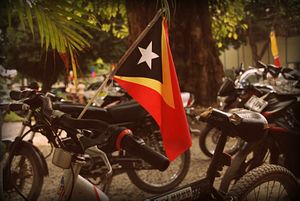The article “Papua New Guinea, Timor-Leste Prepare for Strategic Elections,” published November 14 in The Diplomat, opined on the likelihood of Timor-Leste’s early accession into the Association of Southeast Asian Nations (ASEAN) while omitting to take into account significant milestones achieved by the country over the past eight years.
Timor-Leste, located in Southeast Asia – recognized as a sovereign state by all ASEAN members and ready to abide by the Charter and willing to carry out the obligations of membership – already fulfills all the membership criteria stipulated in Article 6 of the ASEAN Charter. In recent years, embassies have been established in all ten ASEAN countries and Timor-Leste already participates in ASEAN Regional Forum meetings and workshops.
From the restoration of independence in 2002, regional integration has been a foreign policy priority evidenced by Timor-Leste’s active participation in forums such as the annual Shangri-la Dialogue in Singapore, the Jakarta Defense Dialogue, the Bali Democracy Forum, the Bali Process, the Southwest Pacific Dialogue, and more. On the international front, the country pioneered the G7+ group and has just finished its two-year leadership role in the Community of Portuguese Language Countries, representing nine countries and over 250 million people.
Timor-Leste’s ASEAN National Secretariat has rolled out comprehensive awareness and capacity building programs to ensure that the country ticks all the boxes for integration with ASEAN. This year, Dili hosted the 2016 ASEAN Peoples’ Forum, the largest annual gathering of civil society from the region.
On the human and economic development front, Timor-Leste has made notable gains.
A recent report by the World Bank indicates that “Timor-Leste is facing an outlook starkly different to its recent past. Previously one of the most oil-dependent countries in the world, it could become a post-oil country in as little as five years’ time.” The same report observes that the government’s “reform efforts are beginning to show results, with a pipeline of FDI [foreign direct investment] emerging.”
The World Bank forecasts Timor-Leste’s economy to clock 5.0 and 5.5 percent growth in 2016 and 2017, respectively.
In the Boston Consulting Group’s 2016 Sustainable Economic Development Assessment, Timor-Leste ranked 7th of 160 states for making the most progress in converting economic growth into well-being. A major study announced at the United Nations this year and published in the medical journal The Lancet rated Timor-Leste the “most improved” of 188 nations in the health-related Sustainable Development Goals index for the period 2000-2015.
The government’s faithful implementation of the country’s Strategic Development Plan is delivering essential infrastructure such as roads, electricity (72 percent of Timor-Leste’s population now live in households with access to power), telecommunications, and internet connectivity. A new world-class port is scheduled to come on line in 2020. Economic diversification, the steady increase in foreign investment, and the nurturing of small and medium-sized enterprises ensure that the country’s economy will grow and create jobs and opportunities for the youth.
The author of the referenced article framed Timor-Leste as a “struggling democracy” with “a history of communal violence.” That is unfair. Timor-Leste has been peaceful for the greatest part of its 14 years as an independent nation. A flare-up in the early years of independence – a common occurrence in post-conflict situations – was doused within a relatively short time and the country returned to calm.
As for democracy, in today’s context where many countries struggle to mobilize their citizens to the ballot box to vote, Timorese do not take their democratic rights – for which they have paid a great price – for granted. Voter turnout is high. Local elections conducted across the country’s 2,225 villages in October and November this year were orderly, free, and fair with results accepted by all. The number of women elected to the position of suco (village) chief doubled. Timor-Leste has every reason to look to the upcoming presidential and parliamentary elections in 2017 with confidence and as valued opportunity for people to participate in the democratic process.
Having emerged from a long foreign occupation, Timorese leaders of every political stripe highly value peace and stability as fundamental to the national interest. The citizenry will not reward those who try to make political gains by sowing strife.
While the size of the Timorese economy and market are currently relatively small, they will grow. Size does not, will not, and should not preclude Timor-Leste from being brought into the fold of ASEAN, which was created with the view toward establishing and maintaining peace and stability so that the countries of Southeast Asia can focus on nation-building and development. It is the success of this basic vision of ASEAN that has led it to its next iteration as the ASEAN Economic Community.
Peace, security, and stability are mutually reinforcing in the neighborhood of nations. They remain ever relevant and the bedrock of ASEAN. Timor-Leste has emerged from a difficult history to form a firm friendship with its neighbor and former occupier, Indonesia. Both countries recognized that mutual respect and support are necessary for both Timor-Leste and Indonesia to nurture and consolidate their developing democracies. This has been a remarkable example of reconciliation and mutual consideration.
Every country in ASEAN has expressed support for Timor-Leste’s entry into the grouping. Timor-Leste brings to the table the valuable experience of peace-building, a link to the Lusophone countries, a bridge to the South Pacific, and the opportunities of a new and untapped market and destination. The inclusion of this Southeast nation into ASEAN will further enhance the stability and prosperity of the region.
Agio Pereira is the Minister of State and Spokesperson of the Government of the Democratic Republic of Timor-Leste.

































